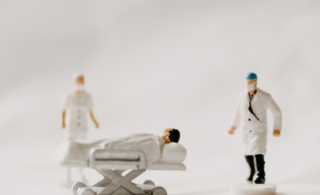
So you have just been diagnosed with breast cancer and you’re probably feeling overwhelmed! Everyone has their own way of taking the news, absorbing it, processing it and working out what it means for them but if you are open to advice, pop the kettle on, make a nice cup of tea and here are the things we think it’s worth knowing straight after receiving a diagnosis. We’ve written this from our own experience as people who’ve had breast cancer and been through the treatment.
Shock. Immediately after hearing the news, you may be in a state of shock. You may find that you can’t remember what the doctor told you at the diagnosis appointment, and you may be feeling overwhelmed by all the information given to you. This is a perfectly normal reaction.
Fear. Yes, you may well feel scared and this is 100% normal.
It’s not your fault. It’s important to know that it is not your fault that you have got cancer. Breast cancer is random and anyone with breast tissue can get it – which means anyone: whether you are female, male or transgender (sex reassignment surgery for female to male transgender does not necessarily remove all breast tissue). Don’t feel guilty or that you are in any way to blame. It’s also important to know that people of all ages can get breast cancer. It’s not just a disease affecting older women, but younger women can also get it. There is support for everyone.
Relax. Take a deep breath. Yes it can feel impossible to relax when you can barely breathe, but things like mindfulness will help get through this detour in your life. Take a look at the section on relaxation.
Have patience and take each step at a time. It can be a long haul getting through the treatment for breast cancer. If you are used to ploughing through life in the fast lane then be prepared for life to slow down – welcome to the crawler lane. Start learning the art of patience now. Think of it a bit like a Toblerone chocolate bar. Break down the appointments and treatment stages into manageable chunks and deal with them one at a time as and when you get to them.
Trust. You will need to put your trust in your breast surgeon, oncologist, breast care nurse, chemo nurses and radiotherapy nurses. But do not be afraid to ask questions and to seek a second opinion if you feel that you need to.
Take back some control. Yes your life is now in the hands of doctors, oncologists, breast surgeons, radiographers and a whole host of other people you will meet over the coming months (plus plenty more behind the scenes) but take control where you can. Part of the scariness of diagnosis can be the feeling of losing control over your life but you can regain an element of control by getting into organise-mode and preparing as much as possible for each stage of treatment.
Ask questions. Don’t be afraid to ask questions. Ask anything and don’t be embarrassed about asking anything. You are entitled to ask whatever you wish. It’s your body after all. Keep a notepad and pen with you so you can make a note of any questions and then record the answers when you see your medical team.
You are the no. 1 priority now. Now is the time to put yourself and your own needs first for a change. It is ok to be selfish and think of yourself. Yes, you can (and should) have a mid day nap on the sofa. Yes, it is ok to tell people to give you some space. Yes, you can ask for help. Be kind to yourself.
Telling friends and family. Allow yourself to process the news at your own pace and don’t feel in a rush to tell friends, family, work, your children and so on. Some people find it helpful to set up WhatsApp groups (and using the setting which turns off the ability for people to reply) and this is a good way to keep everyone updated without having to send lots of individual messages. When it comes to telling your children about your diagnosis, we have a lot of advice on how to go about this. Our page, Parenting with Cancer, will direct you to resources and articles on this.
Ask for, and accept, help from friends and family from now on. It is an alien concept for some us to accept or ask for help, but you will need help and now is the time to adjust to this. Everyone who offers you help really means it and wants to help so don’t feel embarrassed or uncomfortable in accepting it.
Rest. Don’t hesitate to take a rest – put your feet up, take a nap or sit down for a cuppa. And DO NOT feel guilty about it.
Do NOT Google breast cancer. There is an overwhelming amount of information online about breast cancer treatment, different cancer drugs, survival statistics, medical terminology and so on. Some of it is quite scary and startling, some of it is out of date, some of it is incorrect, some of it is not relevant to you and some of it is just rubbish. Stick to the well known, up to date, recognised websites (take a look at the Useful Links and Resources section). And don’t feel any pressure to find out more information about your diagnosis now – it’s perfectly OK to take your time and avoid all websites, forums, books, patient leaflets and anywhere that talks about breast cancer and its treatment until you are ready.
You are not alone. There is a whole community of people behind you. You’ll find support from the hospital team – ask your breast care nurse what is available. There are plenty of places outside your hospital where you can get support – see our Directory of Help and Support Services. You can connect with others going through it via online forums and support groups – see our Support Group article. If you are feeling up to it and you want to read about other people going through it, you can dive into the Personal Stories section of this website. Reading these articles will make you realise that you are not alone on this journey, and that there are so many more people just like you. Future Dreams also offers a range of virtual and in-person support groups, workshops and classes.
Everyone has a different experience. It is worth remembering that everyone has a different breast cancer story: there is more than one type of breast cancer; there are many different treatment plans and different surgeons and oncologists may do things differently. Some people have chemotherapy and then surgery, whilst others have surgery then chemotherapy. Not everyone has chemotherapy. Not everyone has radiotherapy. Your treatment plan will be personal to your own situation. So do not compare your diagnosis and treatment plan with those you read about, or with those people whom you meet along the way.
What exactly is breast cancer? Many of you will not know much about breast cancer when you are diagnosed. You may think that there is just a one-size-fits-all breast cancer and that everyone has the same treatment. This is actually not the case. It can be scary to read more about breast cancer, but for a straightforward overview, take a look at our page What is Breast Cancer?.
The statistics are not all bad. If you don’t know much about breast cancer, you may think that it is an automatic death sentence. It is not. There have been lots of positive medical advances over the years resulting in some very effective treatments for breast cancer. For those of you up to reading more about this, Cancer Research UK have some helpful information on their website.
Treatment is not always linear. There will be a team of medics involved in your treatment and there will be a “treatment plan” for you. However, treatment is not always linear and it doesn’t always follow the plan. Things might come up along the way that change the original plan and it’s worth being prepared for this.
There is no right way to do cancer. Upon being diagnosed with breast cancer, some people will grab the “breast-cancer-bull” by the horns: reading up on every single aspect of breast cancer treatment and research that they can get their hands on, asking their breast cancer surgeon and oncologist plenty of questions, squirreling away on the internet trying to find the answer to all the questions that their breast cancer surgeon and oncologist cannot answer and joining every support group that they can find. They want to know more: they want to be 100% informed about their treatment options, prognosis, and chances of survival recurrence and further spread.
On the other hand, some people will put up a mental wall and bury their heads in the sand: they are not interested in anything other than what they are told by their medical team. There is only so much space in one’s brain and after a cancer diagnosis most of that space is taken up with the diagnosis and the associated feelings about it. For these people, they just don’t have any extra space in their brain to deal with anything over and above the fact that they have breast cancer and have to go through, what looks like, a pretty tough treatment plan. They don’t feel up to visiting a support centre, speaking to anyone else with breast cancer or reading anything which remotely relates to breast cancer and its treatment. Most of all they are scared to look on the internet because they feel unable to cope with filtering the overwhelming/irrelevant/untrue information that is abound on the internet.
Whilst it is absolutely fine to take either of these approaches to a breast cancer diagnosis, most people fall somewhere in the middle of these two extremes. Most people want to ask a few questions, do a bit of research and check their options. However you deal with your diagnosis is fine. There is no right or wrong way. It’s all very personal and it’s important to do what feels right for you.
Further information
There is a lot of really helpful information available to help you through your breast cancer treatment. Resources available to you include:
1. There are A LOT of websites providing information about breast cancer treatment. We have popped a list of super-helpful websites and links in the Useful Links and Resources section of this website.
2. Throughout this website we direct you to online resources which provide more detail about each particular topic.
3. Ask your chemo nurses and oncologists any questions at any time.
4. Macmillan and Breast Cancer Now have super helplines manned by experienced nurses and experts which you can call for advice.
5. Local cancer centres often have drop in sessions for breast cancer patients and sometimes telephone helplines – ask your GP or breast care nurse for more information.
6. And if you want to connect with others going through breast cancer treatment then there are plenty of ways to do this (see the section You Are Not Alone: Groups and Online Forums).
7. Glossary of breast cancer terminology – Our list of terms and words you may come across during your breast cancertreatment, and what they mean.
8. If you would like to read more information about your diagnosis, such as what the terminology means, the types, grades and stages the have a look at this Breast Cancer Now section on diagnosis. And for Information about breast cancer treatment – more information about diagnosis, tests, staging and grades of breast cancer and treatment then you may wish to download (or order a hard copy to be sent to you in the post) the Breast Cancer Now Booklet Treating Primary Breast Cancer.
“This booklet sets out the standards of care that women undergoing treatment for early breast cancer can expect in England and Wales. It explains the diagnosis and treatment of early breast cancer, which is breast cancer that has not spread beyond the breast and armpit lymph nodes. It talks through the care that women diagnosed with breast cancer may experience.”
Note that this booklet goes into quite a lot of detail about each step of the process from diagnosis onwards and is an excellent resource if you are looking for information at that level of detail.
9. Here is an excellent article called Patient Advocacy: Understanding Your Illness by Marie Ennis-O’Connor from the Patient Empowerment Network which gives a list of things to think about after receiving a diagnosis.
10. Breast Cancer Now offer a service called “Someone Like Me” whereby you are matched to someone who has been through a similar experience to you and you can talk to them or email them about your diagnosis, treatment and the experience generally.
11. Books:
Ticking Off Breast Cancer by Sara Liyanage, provides an account of going through treatment – it’s a bit of a heads-up of what to expect together with loads of checklists to help you get organised with the practical side of going through treatment.
The Complete Guide to Breast Cancer by Professor Trisha Greenhalgh and Dr Liz O’Riordan (breast cancer professionals who have also had breast cancer) is full of helpful information about going through breast cancer and understanding the medical side of things.
Reconstruction by Rosamund Dean, “Reconstruction is a pragmatic but positive handbook for anyone navigating a diagnosis of primary breast cancer. It contains clear, useful advice on what to do and what to expect at all stages of treatment.“
Future Dreams hold a range of support groups, classes, workshops and events to help you and your carers during your breast cancer diagnosis. These are held both online and in person at the London-based Future Dreams House. To see what’s on offer and to book your place, see here.
To return to the homepage of our Information Hub, click here where you can access more helpful information, practical advice, personal stories and more.
Reviewed May 2023
The information and content provided on this page has been written from a patient’s perspective then reviewed by a breast care nurse and it is intended for information and educational purposes only. It is not intended to substitute for professional medical advice. Please contact your medical team for advice on anything covered in this article and/or in relation to your personal situation. The links and/or recommendations in this article to third-party resources are for your information and we take no responsibility for the content contained in those third-party resources. Any product recommendations made in this article are not product endorsements and unless otherwise stated, they are made without any affiliation to the brand of that product. We ask you to note that there may be other similar products available.
Share

Support awareness research
Donate to those touched by BREAST cancer
Sylvie and Danielle began Future Dreams with just £100 in 2008. They believed nobody should face breast cancer alone. Their legacy lives on in Future Dreams House. We couldn’t continue to fund support services for those touched by breast cancer, raise awareness of breast cancer and promote early diagnosis and advance research into secondary breast cancer without your help. Please consider partnering with us or making a donation.



